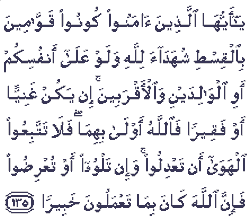Justice, Positive Thoughts, Corruption
Issue 212 » March 7, 2003 - Muharram 4, 1424
General
Al-Nisa
(The Women) Commentary: There is one word that captures the essence of all Islamic laws and all Islamic teachings; one word that describes the overriding value that permeates all Islamic values. Justice. Under normal circumstances many people can be just. But Islam commands its followers to be just even in the face of strong conflicting emotions. In dealing with other human beings, two major impediments to justice are:
An eye for an eye Justice does require retribution and Islam does call for, "an eye for an eye." But it does not mean an innocent eye for an innocent eye; it means the eye of the perpetrator for the eye of the victim. It is amazing how those who call the latter as barbaric, actually rally for the former when a real crisis develops. [Compiled from "What Does Islam Teach about Justice" by Khalid Baig] |
Positive and Beneficial Thoughts “Always entertain positive and beneficial thoughts, and seek the help of Allah in accomplishing your tasks, and never feel helpless or impotent. If, in spite of your best efforts, something does not work out the way you had planned, then simply say, that was Allah’s Will; He does what He wills, but never say to yourself, I wish I had done this or that, if it had been so, it would have been different, for such thoughts (are not constructive at all and) only open the door for Satan to act!” It was because of the balanced understanding concerning Divine Will and human choice that the early Muslims were the most active and dynamic in their approach to taking action to improve themselves and the society around them. Their belief in qada’ (Divine Decree) and qadar (pre-determination), instead of making them passive and complacent, acted as a powerful impetus for change. They believed that nothing in the universe can stop them if they believe in Allah and their own power to realize what is beneficial. [Taken from "The Concept of Luck in Islam" by Shaikh Ahmed Kutty] |
This will be a series based on the book "Building a New Society" Corruption in Public Life At the Public level, despite measures for increasing efficiency, cost-cutting, and developing more effective communication and information systems, public values are generally on the decline. The long process of industrialisation and bureaucratisation, has predominantly been the cause in our opinion, of over-looking personal and public values. In the public scene, one, therefore, can find that organised crime is on the increase, and social inequalities are becoming more manifest and deep-seated. Public institution, that were expected to support and hold communities and society together, are themselves decaying from within. The number of cases being reported of malpractice found in financial, legal and political institutions are increasing by the day. Tax evasion, manipulation of share prices, squandering of public money, loyalties and commitments to partisan policies rather than public welfare, and government secrecy and lack of accountability, are just some of the corrupt practices beginning to sprout in public life. Similarly, with lawyers fee reaching unaffordable levels, there is a growing scepticism of whether the judicial system is able to deliver justice - obviously the rich and powerful are able to gain advantage. In addition, while the rich have opted for private healthcare, education and pensions, the poor are at the mercy of under-resourced and ineffective public services. [Compiled from "Building a New Society", by Zahid Parvez, pp. 80, 81] |
